Behind the Console with Trina Shoemaker
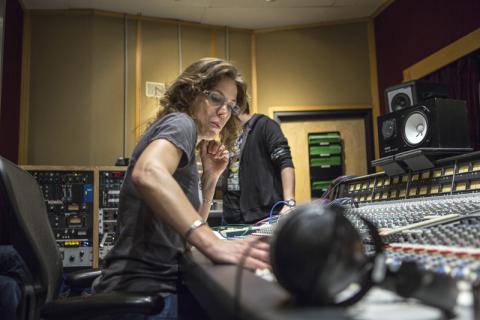
Trina Shoemaker records tracks in Studio A.
Photo by Kelly Davidson
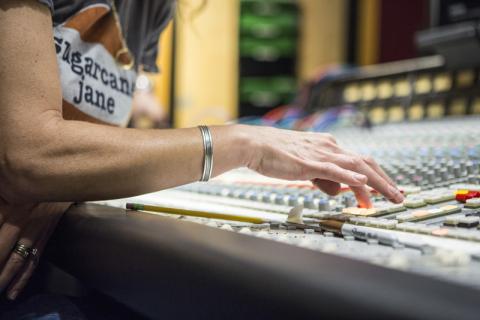
Shoemaker was just a child when she first got interested in the concept of production and engineering.
Photo by Kelly Davidson
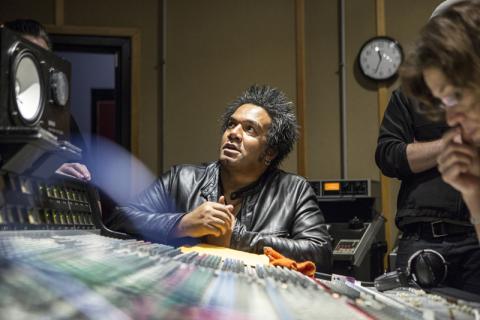
Singer-songwriter Jeffrey Gaines in the studio with Shoemaker.
Photo by Kelly Davidson
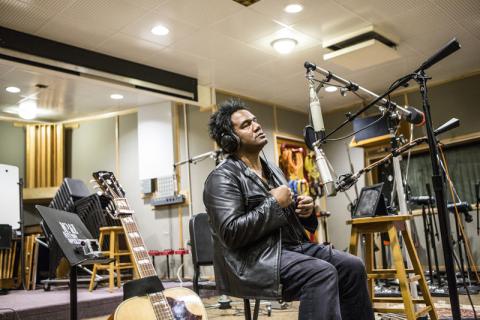
Gaines sings his latest tune, "Firefly Hollow."
Photo by Kelly Davidson
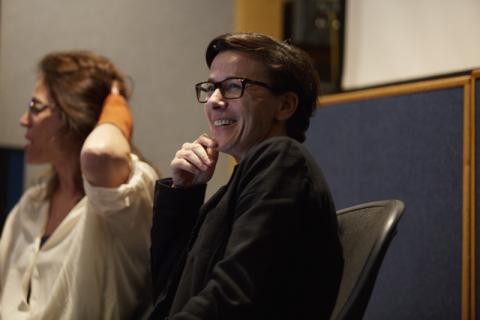
Shoemaker and assistant songwriting professor Melissa Ferrick talk about the making of Ferrick's forthcoming album.
Photo by Kelly Davidson
Behind the console in Studio A, Trina Shoemaker played a smattering of tracks she mixed for musicians such as Emmylou Harris and Brandi Carlile. It’s a routine she follows while getting acquainted with equipment in a new environment to understand how the music sounds in the room.
“I feel good in here. I feel confident in here,” Shoemaker said as she grooved to the music and prepped for a recording session with singer-songwriter and guitarist Jeffrey Gaines. The Grammy-winning mixer, producer, and sound engineer was on campus for a week in late March as part of the Music Production and Engineering Department’s artist-in-residence program.
Shoemaker talked as she worked, dispensing advice or demonstrating techniques to the captivated students. She showed them how to check the bass by pressing your legs against the console; the importance of turning down the volumes before switching speakers; making sure the artist has water; and properly setting up vocal mics.
Gaines and Shoemaker worked together more than 15 years ago; Berklee paired the two again for this session, during which they recorded basic tracks for Gaines’s new song “Firefly Hollow.”
Shoemaker, in addition to Harris, Carlile, and Gaines, has worked with such artists as Sheryl Crow (she won two Grammys for her work on The Globe Sessions), the Indigo Girls, Queens of the Stone Age, the Dixie Chicks, Blues Traveler, Iggy Pop, and Patty Griffin. More recently, she worked with singer-songwriter and Berklee assistant songwriting professor Melissa Ferrick, mixing her forthcoming album, The Truth Is.
During Shoemaker’s visit, she and Ferrick talked before a rapt audience in Studio A about the making and mixing of The Truth Is, playing selections and answering questions. Incidentally, the two had never met before; they worked remotely—Ferrick in Boston and Shoemaker in her Alabama studio—but both agreed it was an instant connection.
Shoemaker also took time out to talk with berklee.edu about her Berklee visit, sharing advice for aspiring engineers, producers, and mixers, and a story about how a chance meeting more than 20 years ago with Berklee MP&E professor Susan Rogers influenced her career path.
The following is a condensed and edited version of that conversation.
How did it feel working with Jeffrey again?
Exactly how it felt when I made a record with him 17 years ago. He’s really creative. He’s really talented.
Tell me about being an artist in residence at Berklee.
I want to show them what I know.
I found a way to make my living in this business and I’ve been doing it for, really, almost 30 years. I have a great track record with some Grammys, I’ve made some great records. I’ve never had that big hit or string of hits that brought me financial security or solvency so I have to stay really hungry and I still have to work really hard and make my living.
A lot of students will leave here and some will have hits and go onto careers that bring them enormous fame and money. Most of them, I think, will go out into the world, love what they do, and make music for a living.
I’ve heard that a connection with Berklee MP&E professor Susan Rogers played a role in your career.
It’s because of Susan that I was able to have the wherewithal to go forward and have a career, because of a meeting that lasted about 10 minutes in Susan’s studio in L.A. In 1990 or 1991 I was doing a record for a friend of mine. I wanted to be an engineer. I spent many years trying after London. I didn’t know who Susan Rogers was and she was behind the console. She explained to me what she was doing and she said if you really want to do this, you need to learn how to line up tape machines, and know what a patch bay is, how to solder, and you need to leave L.A., it will never happen for you here. You need to go somewhere else and figure it out. So I did. Within three days, I had found a little tiny recording school in L.A. where I could learn how to line up tape machines and solder and build patch bays and do really basic analog assistant jobs. It wasn’t like it is today.
The minute I was done with that recording school, which I think lasted four months, I got on a plane and flew to New Orleans. I didn’t know anybody and I applied at all the studios and got hired as a maid and I worked my up as a maid cleaning studios, including (record producer) Daniel Lanois’s. Once I was in Lanois’s, I stayed there and even became chief engineer there. That title didn’t even really mean anything but I was exposed to the great record-makers, and producers or engineers coming through, and Dan himself. He’s a brilliant record-maker. He taught me some things that will cause me to make what I think are great records for rest my career. So did Mark Howard, who was his engineer; so did Malcolm Burn, who was his engineer; and so did Hugh Harris, that guy from London who first let me touch a role of tape, touch it on a locator.
It’s not because I hooked up with Sheryl Crow. It's Hugh, Susan, Dan, Malcolm, and Mark. These are the people who gave me first the confidence and then the skills to even be able to be considered by Sheryl.
What got you interested in music production and engineering in the first place?
I wouldn’t have known those terms (producer, engineer), or those jobs or roles, but I’d say around age 6 or 7, I became obsessed with recorded music. I put on headphones and I was obsessed with how the songs were. Not how they got written, not how people sang, not how a piano got played, but how what had come to pass existed on vinyl. Why did it come out of speakers and, more importantly, if I put on headphones why is this instrument here and this one here and how. I imagined there was must be this world where a recording was like an orb, a circular three-dimensional event that took place instantaneously. It got played and things appeared inside headphones.
As I got older, in middle and high school, I was interested in album jackets. Then I understood that there were recording studios and recording control rooms.
What is your impression of Berklee?
I am so blown away by this institution that I’m speechless. It has a group of incredibly diverse, focused, wonderfully talented, mature kids. They came here because they are going to be musicians. They already are and they’re going to make records. They’re going to do film scores. They are so equipped with this education and so ahead of their peers that it’s ridiculous. They’re the cream of the crop.
